|
|
|
Sort Order |
|
|
|
Items / Page
|
|
|
|
|
|
|
| Srl | Item |
| 1 |
ID:
109984


|
|
|
|
|
| Publication |
2011.
|
| Summary/Abstract |
Much of the existing research examining the acquisition of English language skills amongst refugees and other newly arrived migrants, both in Australia and internationally, assumes a relatively straightforward relationship between English language proficiency and inclusion within the broader community. This article presents contrary findings from a study of two South Australian primary schools with New Arrivals Programmes (NAPs). By examining data from both a questionnaire administered to teachers and ethnographic observations of children at play in the school yard, the findings presented here suggest that students in NAPs will be differentially invested in learning English according to the degree of exclusion they experience in the school environment and the impact this has upon their perception of the value of learning English as a mode of engagement. In response, the article calls for an approach to education that is situated in global contexts of colonisation and power relations, and where the terms for inclusion of NAP students are mutually negotiated, rather than predetermined.
|
|
|
|
|
|
|
|
|
|
|
|
|
|
|
|
| 2 |
ID:
109976
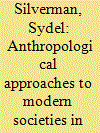

|
|
|
|
|
| Publication |
2011.
|
| Summary/Abstract |
At the time that Julian Steward was formulating the Puerto Rico Project, several other approaches to complex societies were being pursued by American anthropologists. Beginning in the 1920s, funders'-and subsequently, New Deal agencies'-interest in addressing social problems impelled microcosmic community studies in the United States. That approach, essentially functionalist and ahistorical, was extended to village studies in other countries, and Redfield's folk-urban continuum became the dominant theoretical framework for comprehending regions within nations. Concurrently, acculturation theory legitimized anthropological interests beyond "primitives" and offered an alternative, two-way cultural contact model. With the onset of World War II, the culture and personality approach was applied to strategic nations, providing holistic configurational depictions of national character. Steward's effort can be seen as a critique of, and alternative to, these approaches that were prevalent in the late 1940s. Building upon his method of cultural ecology, his orientation toward work, and his notions about sociocultural integration, he devised a different way of studying a total society. Steward's framework was modified and expanded by members of his team, both in the field and in the writing of the jointly authored book. While slow to have a wider impact, the project-both in its successes and its limitations-signaled new departures for the anthropological study of the modern world.
|
|
|
|
|
|
|
|
|
|
|
|
|
|
|
|
| 3 |
ID:
109978
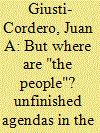

|
|
|
|
|
| Publication |
2011.
|
| Summary/Abstract |
The People of Puerto Rico is a comprehensive ethnography of major types of rural communities in pre-1950 Puerto Rico but was less successful in reconnecting those localities in a coherent portrayal of the island's social formation. A reexamination of this work's best-known subcultures, Santa Isabel (Sidney Mintz' "Cañamelar") and Ciales (Eric Wolf's "San José"), offers entry points to these communities, as well as to the key concepts that Mintz and Wolf constructed reciprocally through their research: rural proletarian and peasant, plantation and hacienda. Also present are the too-implicit spatial referents of these concepts-lowland and highland, foreland and hinterland-and their associated crop types, sugar and coffee. In this article, the historical space of Santa Isabel and Ciales will be reconsidered, in part with reference to often-overlooked nuances and caveats in Mintz' and Wolf's chapters. Foregrounding the spatial/ecological referent in "Cañamelar" and "San José" opens our sights to counterpoints between sugar and livestock, and to patterns of highland-lowland migration, kin networks, and social interaction. Familiar concepts take on new meanings as we discern supra-municipal, sub-insular, and intermediate island regions and move closer to specifying historical situations (Mintz) while renewing our theorization (Wolf).
|
|
|
|
|
|
|
|
|
|
|
|
|
|
|
|
| 4 |
ID:
109982
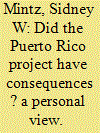

|
|
|
|
|
| Publication |
2011.
|
| Summary/Abstract |
Those of us who participated as fieldworkers in the Puerto Rico Project gathered regularly at the University of Puerto Rico (Río Piedras) during the eighteen months we were in the field to compare notes, discuss our work together, and advance our research cooperatively. During that time a distinct difference between our integration in the communities where we were working and in the university community where we gathered became apparent to some of us. It was a coefficient of the class and other differences that separated the university faculty from the working men and women among whom some of us lived in the field, and it was reflected in political differences, among others. A substantial fraction of the university faculty was strongly committed to political independence, whereas a large majority of rural dwellers supported the Popular Democratic Party, then in power. It was not surprising that these differences were linked to others, such that some of us felt we were more fully accepted by the laboring classes among whom we lived than by the intellectuals whom we knew at the university. I try here to show how our fieldwork made visible (and troublesome) these sharp political divisions.
|
|
|
|
|
|
|
|
|
|
|
|
|
|
|
|
| 5 |
ID:
109974


|
|
|
| 6 |
ID:
109968
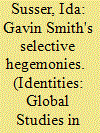

|
|
|
| 7 |
ID:
109973


|
|
|
|
|
| Publication |
2011.
|
| Summary/Abstract |
The article considers in detail mural painting in Santiago, Chile. It examines the history of mural painting, from the early days of support for Salvador Allende's attempt to combat inequality and provide for the basic needs of all citizens, through the repression of the military dictatorship, to the reemergence of the phenomenon in the transition to democracy and up to the present day. It identitifes a range of themes in the contemporary murals: resistance to repression and misrepresentation, past and present; memorials to dead and disappeared people with varying degrees of fame; the situation of women (their roles in resistance and building the future, as well as their specific demands for an end to violence against women and for reproductive rights); and the struggle of the indigenous Mapuche people of Chile for recognition and justice. Analysis explores examples of murals on each of these themes from a number of areas throughout Santiago, with a particular focus on La Victoria, an area noted for solidarity in the face of state repression and the inequalities fostered by neoliberalism.
|
|
|
|
|
|
|
|
|
|
|
|
|
|
|
|
| 8 |
ID:
109980


|
|
|
|
|
| Publication |
2011.
|
| Summary/Abstract |
In the 1970s in Mexico, anthropological regional projects were designed to explore new research interests: irrigation works, peasants, rural capitalism, and mines. Julian H. Steward, Eric R. Wolf, and Sidney W. Mintz, participants in the research project on Puerto Rico, were all popular authors among the new generation of anthropologists and were frequently cited in their thesis bibliographies. This article explores the influence of the People of Puerto Rico project at the design level of these new collective and regional projects. Students were distributed within larger areas, covering various climatic and production subareas, in their research training. The important role of cities, industries, haciendas, markets, and government programs was highlighted. I suggest that senior anthropologists and academic leaders who were planning this new anthropological era were more familiar than their students with the conceptual lines of the Puerto Rico Project. I gained greater insight into the difficulties of a regional research enterprise when I did anthropological research in the 1980s at the Tennessee Valley project.
|
|
|
|
|
|
|
|
|
|
|
|
|
|
|
|
| 9 |
ID:
109977


|
|
|
|
|
| Publication |
2011.
|
| Summary/Abstract |
The People of Puerto Rico occupies an ambivalent place in both the genealogy of anthropological theory and the understanding of Puerto Rican society. Its co-authors collectively developed a uniform and complex conceptual scheme which expressed both convergence and divergence among them. The book furthered Marxist approaches in U.S. anthropology and was the first serious scholarly materialist analysis of Puerto Rico. While privileging the lives of common people, it fell short of representing important strains of Puerto Rican diversity and socio-historical dynamics. The Puerto Rico Social Anthropology Project used four different models to explain the genesis of cultural forms and the interrelations among aspects of society/culture, in a given, homogeneous, "subculture" or "socio-cultural segment" of a complex society. The Project's members stressed a linear-utilitarian analysis of these subcultures, but where they could not account for observed cultural forms with such an approach, they appealed to the culture-psychology relation. This article considers the four interlinked paradigms, the associated analysis of socio-cultural trends, the resulting problematic theoretical consequences, and the flawed Marxism of the work.
|
|
|
|
|
|
|
|
|
|
|
|
|
|
|
|
| 10 |
ID:
109972


|
|
|
|
|
| Publication |
2011.
|
| Summary/Abstract |
This lecture addresses the connection between the production in the present of particular memories of the past and the ability to frame present-day conflicts in ways that render certain possibilities legitimate while excluding others. Through the ethnographic material I have gathered during my career I will show how different projects of the future (personal and collective) appeal to memories of conflict that link responsibilities and generations at different scales. Taking as my object of observation the transformations in economic relations in a heavy industrial region of northwestern Spain I will trace the connections between the languages and practices of contention, the reconfigured structures of production and governance, and the production of diverse memories (and silences) of conflict. Diverse memories produce struggles framed in class terms, or struggles framed in terms of corporatist interests, or in terms of contingently defined social claims. Through this often ambivalent delimitation of conflicts between past and present, the field of possible futures gets configured and with it the spectrum of possible political action.
|
|
|
|
|
|
|
|
|
|
|
|
|
|
|
|
| 11 |
ID:
109967


|
|
|
| 12 |
ID:
109979
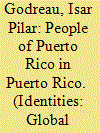

|
|
|
|
|
| Publication |
2011.
|
| Summary/Abstract |
Like other students of social sciences trained in Puerto Rico in the late 1980s and 1990s, the author of this article learned about The People of Puerto Rico while studying abroad in the US - not in Puerto Rico. This article explores why, in spite of its influential contribution to anthropology and to the social sciences in general, this important book was not widely read or taught at the University of Puerto Rico (UPR). To explore this paradox, the author examines the very critical reception that the People of Puerto Rico project had among Puerto Rican academics at the time of its development and thereafter. The article pays particular attention to the political climate and to the criticism posed by Dr. Milton Pabón, a political scientist who believed in political independence for Puerto Rico. Pabón disagreed with, among other things, the book's understanding that Puerto Rico did not have a "national culture." Pabón died in 2009, but offered an interview and wrote an unpublished manuscript about the book before his death. This paper summarizes some of his views and contextualizes the effects of similar "pro-independence" critiques on the limited dissemination of the book at the UPR. The article contrasts such views to more contemporary "post-modern" understandings of the Puerto Rican nation. Finally, based on an analysis of informal interviews, library records, and the graffiti of library copies, the author also comments on the current reception of the book among university students.
|
|
|
|
|
|
|
|
|
|
|
|
|
|
|
|
| 13 |
ID:
109970
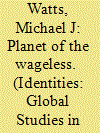

|
|
|
| 14 |
ID:
109975
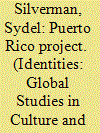

|
|
|
|
|
| Publication |
2011.
|
| Summary/Abstract |
In the late 1940s Julian Steward initiated a social anthropological study of Puerto Rico, carried out by a team working in a range of communities representing different ecological zones. The project was a landmark in anthropology but met with criticism from Puerto Rican scholars. The articles in this collection reconsider the Puerto Rico Project in terms of its place within the history of anthropology, its reception in Puerto Rico and elsewhere, and some theoretical and political issues raised by it.
|
|
|
|
|
|
|
|
|
|
|
|
|
|
|
|
| 15 |
ID:
109971
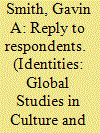

|
|
|
| 16 |
ID:
109981


|
|
|
|
|
| Publication |
2011.
|
| Summary/Abstract |
This article discusses an unknown restudy of one locale of the People of Puerto Rico Project-my own. From 1980 to 1982 the author did ethnographic fieldwork in Bo. Jauca, Santa Isabel, the research site of Sidney Mintz. Building on Mintz's work, my goal was to take our shared historical materialism further, into a broader analysis of capitalism, colonialism, class, politics, and power. Where Mintz framed his study within production units, such as Colonia Destino and Central Aguirre, my study began with analysis of the oligarchic structure of the United States sugar industry as a whole, and how it shaped colonial policy. Where the People of Puerto Rico Project reconstructed insular class and political patterns as context for local studies, the restudy took islandwide class structure and political positions as a focus of analysis in itself. Where the earlier work chronicled the rise of a plantation system and rural proletariat, the later study explored their decline-why did the Puerto Rican sugar industry collapse, and how did seemingly homogenous Jauquenos differentiate into a graded system of stratification? The years from 1948 to 1982 saw other class transformations, as the rural proletariat was recast into the larger, more diffuse, and less politically potent category of "the poor" and life circumstances of all Jauqenos became more individuated and dependent on state power centers in San Juan and Washington.
|
|
|
|
|
|
|
|
|
|
|
|
|
|
|
|
| 17 |
ID:
109965
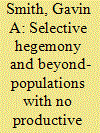

|
|
|
|
|
| Publication |
2011.
|
| Summary/Abstract |
A significant shift in the form of the political economy since the 1980s is frequently described as a shift from the welfare state to neoliberalism, the latter either referring to new principles of rule or more broadly to include the nature of the economy. The paper argues that it is more fruitful to explore how these changes reflected a shift in the dominance of forms of capital-principally from production to finance. The dominant class blocs in the former period pursued hegemonic projects described here as expansive; in the latter period such projects became selective. Insofar as finance capital seeks security through diversification (benefitting from difference) and is not itself productive of value, so it relies on and [re-]producesrespectively, a) selected populations invested in distinctions, and b) an absolute residual population. The politics of the former is one of negotiation, of the latter counter-politics beyond negotiation. Exploration of this difference becomes a crucial task for social analysis.
|
|
|
|
|
|
|
|
|
|
|
|
|
|
|
|
| 18 |
ID:
109969
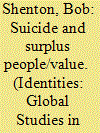

|
|
|
| 19 |
ID:
109983
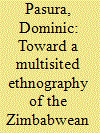

|
|
|
|
|
| Publication |
2011.
|
| Summary/Abstract |
Classical diaspora scholars have constructed diasporic identities in essentialistic and unitary fashion, with phrases like the "Jewish identity," "Palestinian identity," and "Irish identity" denoting migrants as homogeneous ethnic communities. Using the author's multisited ethnographic research among Zimbabweans in Britain, the article explores the diverse ways in which diasporic identities are performed, expressed, and contested in Britain. On the basis of data from a pub, a gochi-gochi (barbecue) and the Zimbabwe Vigil, this article argues that the concept of diaspora, by emphasizing a static and singular conception of group identity, removes the particular ways in which diasporic life is experienced. The ethnographic "sites" were chosen to highlight different geographic settings to show the contrast between multicultural global cities and how different spaces of association attracted distinctive diasporic communities of race, ethnicity, gender, class, and legal status. The article identifies a pattern of diasporic identity development that largely uses the homeland as a frame of reference, and this is contrasted with alternative, hyphenated identities that challenge the fixation of identities to a specific place. It can be suggested that these diasporic identities are bottom-up forms of resistance to the institutionally ascribed refugee identity, perceptions of blocked social mobility, racism, and discrimination in the hostland.
|
|
|
|
|
|
|
|
|
|
|
|
|
|
|
|
| 20 |
ID:
109966


|
|
|
|
|
|
|
|